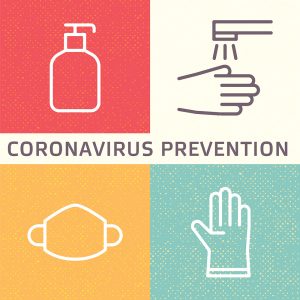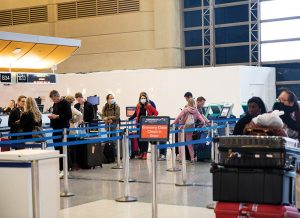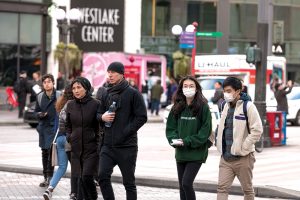Coronavirus’s Impact on Law Enforcement
The term “March Madness” has taken on an entirely different meaning in 2020. Instead of describing the fanaticism focused on college basketball tournament brackets, it’s an apt descriptor of the public’s focus on the spread of coronavirus disease 2019 (COVID-19). This is a novel version of the more common coronavirus, according to the Centers for Disease Control and Prevention (CDC), but shares symptoms such as fever, cough, difficulty breathing and shortness of breath. It can present as a mild respiratory illness, but for at-risk groups, notably seniors with underlying health conditions and people suffering from immuno-compromised illnesses, the result may turn more severe. By March 26, the CDC had confirmed 68,440 cases and 994 deaths in 50 states, the District of Columbia, Puerto Rico, Guam and the U.S. Virgin Islands. However, that tally changes daily.
Public health experts along with federal, state and local leaders have scrambled to respond, from trying to deliver medical tests and health care resources to calming fears. Extraordinary measures have been executed in attempts to arrest infection rates, such as cities and states issuing bans on large gatherings. Universities and schools closed or switched exclusively to online instruction. Major sporting organizations, including the NCAA, MLB, the NBA and NASCAR, all suspended events. Even New Orleans police shut down the Big Easy’s French Quarter on the eve of St. Patrick’s Day.
It’s become clear a public health development of this reach and nature impacts all aspects of everyday life, including public safety. The presence of COVID-19 in cities across the country alters how police execute their duties.
Assessing Risk Factors
Police serve on the front lines of crime in our communities, but because cops directly interact with the public, they’re likely to be exposed to the coronavirus. There already have been reports of such incidents. Early in the virus spread, Washington state earned the dubious honor of having the most cases and deaths. So naturally, its law enforcement professionals and first responders operated under high risk. In fact, 27 firefighters and two police officers were quarantined after responding to calls at the Life Care Center skilled nursing facility in Kirkland, which was linked to 27 of the state’s 40 COVID-19 deaths by March 15. Some of the firefighters demonstrated flu-like symptoms in the days that followed.

To the south, an officer with the Los Angeles Airport Police and a sergeant in Los Angeles Police Department each tested positive. More cases in both agencies followed. In a statement in late March, PORAC Region III Director Marshall McClain, president of the Los Angeles Airport Peace Officers Association, said, “Although we have officers who are quarantined and some who have tested positive for COVID-19, please know that the union is continuing to work with our respective departments and city management to ensure our people are properly taken care of and receive additional resources.”
Also in early March, five Dallas police officers were ordered to remain at home after coming in contact with an individual who believed he was infected.
The officers were dispatched to a disturbance where, upon arrival, they were informed that Dallas Fire-Rescue transported the individual to a hospital for treatment of injuries sustained from an alleged assault, per a police statement cited by the Dallas News. After treatment, the 24-year-old male was discharged into the custody of Dallas police officers. Once booked into jail and charged with the assault of a family member, the man stated he was probably sick with the coronavirus. Dallas County Sheriff’s Department, which has authority over the jail, arranged to transport him to a hospital via private ambulance. It also released a statement regarding updated intake procedures that include precautions related to the outbreak as well as announcing there were no confirmed cases of coronavirus in the jail as of that date.
The Dallas Police Department was also notified and, in turn, alerted its officers that they possibly had come into contact with the virus. The five were “given a day off for precautionary reasons,” the newspaper stated. Plus, the vehicles involved in the arrest were sent for extensive cleaning. Department leaders conferred with local medical professionals to develop appropriate protocol for officer safety during this medical crisis. (See “Preserving Personal Protection” sidebar.)
After all that, the validity of the inmate’s claim has been called into question, perhaps as a ploy to secure a change of surroundings.
“The suspect had no indication of being ill. His claim had no merit,” asserted Mike Mata, president of the Dallas Police Association, to the Dallas News.
Multiple agencies have instituted new personal health safety policies for both sworn and civilian personnel. In Connecticut, the New Haven Police Department has armed patrol cars with a universal precaution bag containing masks, alcohol wipes and gloves. Each vehicle also has been issued hand sanitizers.
Under normal circumstances, the Chicago Police Department’s medical section is staffed during business hours, but by mid-March, it started 24/7 monitoring.
“If somebody does exhibit symptoms, they’re going to be asked to stay home, and that will include police officers,” Chicago P.D. spokesman Anthony Guglielmi told the Chicago Sun Times.
Additionally, Chicago’s mayor temporarily lifted the required biometric authentication for employee sign-in and sign-out. The procedural change was in response to their union’s request to end the contact confirmation to minimize germ spread. The union also asked for mandatory roll calls to be canceled as a social distancing effort.
Controlling Community Contact

Going on calls isn’t the only opportunity for law enforcement professionals to be exposed to COVID-19. Police stations open their doors to the public, welcoming in citizens to report crimes, provide information or request services such as fingerprinting. It’s also a gesture of being a good neighbor. To reduce the risk of incidental exposure, departments have reconsidered their open-door policy, at least temporarily. For example, the Bellevue Police Department in Washington state closed two substations to protect volunteers, many of whom are older and more vulnerable to the virus.
“Our volunteers, there are 16 of them that rotate through the substations, are considered to be at high risk if they were to contract this virus. We’re trying to reduce unnecessary exposure or accidental exposure during this outbreak,” said Meeghan Black of the Bellevue P.D.
“We have decided it’s best to ask them to stay home. We want them to stay healthy. We want the public to stay healthy,” she told KOMO news.
Other Washington agencies canceled meetings and requested residents deal with non-emergency police matters via the phone or online.
“We won’t stop doing police work because of the coronavirus, but we are trying to create a safe environment for everybody,” explained Captain Mike Johnson of the Bothell Police Department in Washington state, which closed its lobby until further notice.
Responding to Reactions

Of course, there will always be an element of society that wants to profit from others’ misery. Scammers have seized this outbreak to trick unsuspecting individuals. In New Jersey, several agencies posted warnings on social media to advise people that the CDC is not sending representatives house to house conducting coronavirus surveillance. Fox News quoted Sussex County officials cautioning residents to “not let them into your home,” and to call police if approached.
At a New York racetrack last month, armed robbers hiding behind surgical masks made off with more than $200,000 in cash, per Fox News. Many attendees that evening also wore surgical masks to protect themselves against contact with the virus, so the thieves blended in with the crowd.
It appears cybercriminals have gotten in on the action, too. Representatives from the Sioux City Police Department in South Dakota told KTIV that it received reports of residents receiving emails, text messages and calls from con men posing as public health experts. The imposters instructed recipients to click on links to gain access to COVID-19 updates, which actually led to requests for personal information.
Then there’s the social phenomenon of panic buying. Government and public health officials called for greater social distancing to mitigate transmission of the virus, prompting employers to close offices and encourage people to work from home. Combined with the fear of possibly having to self-quarantine if tested positive, a consumer panic was triggered. People flocked to stores to stock up on goods. But whenever crowds gather, there’s always the potential for chaos. On March 5, police were called to a Costco in Chino Hills, California, when shoppers’ tempers flared over shrinking supplies. No arrests were made and deputies peacefully dispersed the crowd.
When students at the University of Dayton in Ohio heard classes were canceled due to concerns over coronavirus transmission, crowds formed in the streets, allegedly to celebrate no more school. According to WLWT, objects were thrown and people jumped on cars. Cops from both the Dayton Police Department and the university police showed up in riot gear and fired several rounds of nonlethal paint and pepper balls into the crowd. At least one person was injured before students were cleared off the streets.
Making the Best of a Bad Situation
In deadly serious times like an international pandemic and national emergency, a dose of humor can be the best medicine to help alleviate public fears.
Officials at the Kaysville Police Department, north of Salt Lake City, realized stockpiling had gotten out of hand when toilet paper disappeared from the station’s public restrooms. They posted a plea on Facebook: “For those of you preparing for the coronavirus, what is the need for the hoarding of toilet paper? The Kaysville community must be in a state of crisis that someone has resorted to obtaining all the toilet paper from KPD’s public restrooms. We love our community and we are here to serve you, but cops need toilet paper too! Let’s go back to the days of obsessing over power poles!”
Cops in Kenosha, Wisconsin, weren’t playing around when it comes to dealing with the public’s well-being. On March 9, they just flat-out called off crime. As stated on Facebook, “Due to the growing concern over the flu, Coronavirus and other sicknesses, the decision was made to cancel all crime in the Kenosha area. We are unsure when this ban will be lifted. We ask anyone who was planning to commit any crimes to please stay home for their safety. We will continue to monitor the situation closely.”
The agency concluded its declaration by advising the public to report violations of the cancelation to Crime Stoppers.
While officials continue to grapple with the medical, political and economic fallout of the coronavirus emergency, police professionals across the country reinforce their commitment to serving their communities even in the face of the COVID-19 threat.
For helpful ongoing updates on the evolving situation in California, please be sure to visit PORAC’s COVID-19 Resource Webpage and follow PORAC’s social media feeds.
Editor’s note: This article is reprinted from the April issue of American Police Beat.
